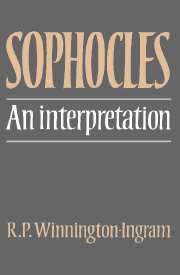Book contents
- Frontmatter
- Contents
- Preface
- Bibliography of short titles
- 1 Introductory
- 2 The mind of Ajax
- 3 The burial of Ajax
- 4 Trachiniae
- 5 Sophocles and the irrational: three odes in Antigone
- 6 Creon and Antigone
- 7 Fate in Sophocles
- 8 The fall of Oedipus
- 9 Furies in Sophocles
- 10 Electra
- 11 Oedipus at Colonus
- 12 Philoctetes
- 13 Heroes and gods
- Appendices
- Select index
6 - Creon and Antigone
Published online by Cambridge University Press: 07 December 2009
- Frontmatter
- Contents
- Preface
- Bibliography of short titles
- 1 Introductory
- 2 The mind of Ajax
- 3 The burial of Ajax
- 4 Trachiniae
- 5 Sophocles and the irrational: three odes in Antigone
- 6 Creon and Antigone
- 7 Fate in Sophocles
- 8 The fall of Oedipus
- 9 Furies in Sophocles
- 10 Electra
- 11 Oedipus at Colonus
- 12 Philoctetes
- 13 Heroes and gods
- Appendices
- Select index
Summary
To take the eros-theme, as we have done, and examine it more or less in isolation from the rest of Antigone, gives a distorted impression of the play as a whole. It is only one figure in the pattern, though perhaps a more important one than has generally been recognized. But where does its importance lie? Haemon was in love and acted tragically under the influence of Aphrodite's power, but he is a minor character; if Antigone was in love, her tragic action was otherwise determined. I have argued above that the theme bears most significantly upon a Creon who set himself to fight against that unconquerable force who is amachos. And the persistence of this theme in the second half of the play might lead us to regard Creon as the central character. Creon or Antigone? This is one of the issues upon which interpreters have been divided.
Antigone is a singularly difficult play to understand. Which is strange, since it makes a universal appeal and has probably been acted in modern times more frequently and more successfully than any other Greek tragedy. Some might say that we make the difficulties for ourselves by seeking more in the play than Sophocles was minded to put into it, though I doubt if this is true. Certainly the divergence of critical opinion has been extreme, with the currents surging this way and that. There is of course an easy way of interpreting Antigone, as there is of interpreting Ajax. We can interpret them both as essentially Aeschylean tragedies of the punishment of hubris – in Antigone the hubris of Creon.
- Type
- Chapter
- Information
- Sophocles: An Interpretation , pp. 117 - 149Publisher: Cambridge University PressPrint publication year: 1980



